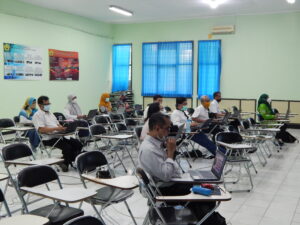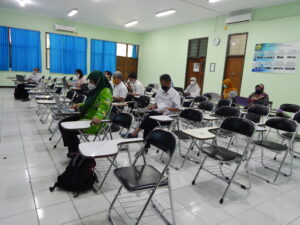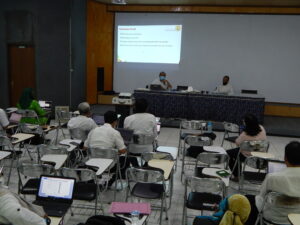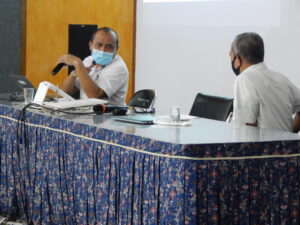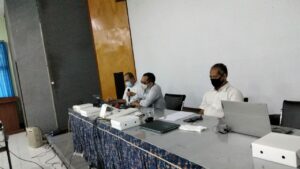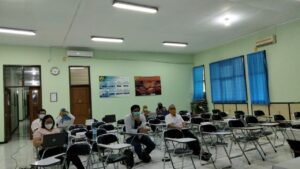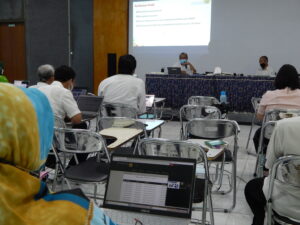 “It is necessary to formulate so that the world of work can quickly absorb alumni, one of which is by making the institution known, such as participating in international accreditation. Besides that, it is also necessary to optimize the role of alumni, so that more alumni get decent jobs,” said Drs. Achmad Sjaifullah, M.Sc., Ph.D. Dean of Faculty of Mathematics and Natural Sciences, University of Jember in the introduction to the Leadership Coordination Meeting within the Faculty of Mathematics and Natural Sciences with the theme of Improving Tri Dharma Perguruan Tinggi in Achieving IKU and technical services in the academic, general and financial fields as well as student affairs (10/1). In the coordination meeting held in the general lecture room of the Chemistry Department, the Dean of Faculty of Mathematics and Natural Sciences hopes to seek international accreditation so that FMIPA can exist more. “Regarding the curriculum resume that has been submitted, we hope that the Department of Biology and Mathematics will continue with assistance from LP3M and involve the roles of UPM and GPM,” he hoped. Regarding Indikator Kinerja Utama (IKU), in terms of writing scientific articles, it is possible to achieve if they are designed properly, the number of research results will be more and more distributed by the community. In front of the Heads of undergraduate and master study programs participating in the coordination meeting, the Dean also said that GPA of FMIPA students was still below university’s GPA of 3.30. This requires an increase in learning instruments so that the achievement of the minimum score can increase without having to reduce quality. At the end of his speech, the Dean of FMIPA again touched on international accreditation to attract prospective master’s students. “It is necessary to strive for international accreditation so that it becomes the target of students, one of which is through the LPDP scholarship, so that the interest will be even higher,” he concluded.
“It is necessary to formulate so that the world of work can quickly absorb alumni, one of which is by making the institution known, such as participating in international accreditation. Besides that, it is also necessary to optimize the role of alumni, so that more alumni get decent jobs,” said Drs. Achmad Sjaifullah, M.Sc., Ph.D. Dean of Faculty of Mathematics and Natural Sciences, University of Jember in the introduction to the Leadership Coordination Meeting within the Faculty of Mathematics and Natural Sciences with the theme of Improving Tri Dharma Perguruan Tinggi in Achieving IKU and technical services in the academic, general and financial fields as well as student affairs (10/1). In the coordination meeting held in the general lecture room of the Chemistry Department, the Dean of Faculty of Mathematics and Natural Sciences hopes to seek international accreditation so that FMIPA can exist more. “Regarding the curriculum resume that has been submitted, we hope that the Department of Biology and Mathematics will continue with assistance from LP3M and involve the roles of UPM and GPM,” he hoped. Regarding Indikator Kinerja Utama (IKU), in terms of writing scientific articles, it is possible to achieve if they are designed properly, the number of research results will be more and more distributed by the community. In front of the Heads of undergraduate and master study programs participating in the coordination meeting, the Dean also said that GPA of FMIPA students was still below university’s GPA of 3.30. This requires an increase in learning instruments so that the achievement of the minimum score can increase without having to reduce quality. At the end of his speech, the Dean of FMIPA again touched on international accreditation to attract prospective master’s students. “It is necessary to strive for international accreditation so that it becomes the target of students, one of which is through the LPDP scholarship, so that the interest will be even higher,” he concluded.
Next session of discussion on academic field I was led by Vice Dean I Drs. Siswoyo, M.Sc., Ph.D. Starting with the even semester 2021/2022 lectures, the implementation is still like the odd semester, namely hybrid. Not completely online nor completely offline, pending an official circular from the university. Meanwhile, research activities for lecturers and students are running normally but still implementing health protocols. The implementation of MBKM requires exploring new partners, and continuing to direct more to BKP of 20 credits. “BKP for independent study by the faculty is still in process, for BKP competition, from the ministry and industry need to be used better,” said Siswoyo. By also participating in UNEJ’s flagship BKP, namely thematic KKN (20 credits) and entrepreneurship BKP.
With 8 MBKM BKP, learning activities do not have to be carried out in Study Programs. Siswoyo said that at FMIPA, 4 BKP had been identified, kampus mengajar, magang, proyek kemanusiaan, pertukaran mahasiswa and studi independen. “84 credits must be designed as body of knowledge of the study program, the remaining 60 credits can be taken with 8 BKP MBKM” he hoped. Vice Dean I FMIPA also shared the good news that FMIPA is leading in implementation of MBKM at UNEJ in 2020 and 2021. University of Jember itself, to prepare for MBKM implementation, MBKM socialization has begun at the study program level, the Thematic KKN BKP model from universities, support for the MBKM information system, namely streamlining the flow outbound (such as acknowledgment of presentations, no need to involve many groups of users, not disturbing the regular SISTER flow), financial support for PKS-based BKP (allocations are still being proposed from bidang 2), the form of recognition of BKP credits in SKPI, and the last is the final project with MBKM. “For the link between the final project and MBKM through the TA process that accommodates the BKP MBKM, simplification of thesis documents (eg journal format, number of pages, reduction of signatures on the validation sheet), and accommodation of student achievement recognitions in the final project.
Coordination meeting also discussed the preparation of study programs regarding national and international accreditation. The Department of Biology is preparing for ASIIN accreditation, followed by the Department of Mathematics. Physics and Chemistry, Lamsama, BAN PT, ASIIN will submit soon. Dean hopes to immediately form a team, assist LP3M and involve the roles of UPM and GPM. For the study program curriculum, it is necessary to improve the curriculum of the S1 and S2 Study Programs which have been SK by the Dean as proof of the curriculum review, for the MBKM corridor in terms of changing grades and so on, it is still facilitated, of course, by completing learning instruments. Vice Dean 2 FMIPA for General Affairs and Personnel conveyed policies related to finance and staffing by describing FMIPA activities in 2022. Followed by Vice Dean 3 FMIPA for student affairs set a target to win in various competitions in KN MIPA coaching, PIMNAS, Satria DATA, PHP2D, WIRADESA, MTQ, and also discusses PPMB which is routinely carried out every year.
Discussion was opened for the coordination meeting participants, starting with the Head of the Mathematics Department, Dr. Kiswara who asked the follow-up of ASIIN, after curriculum resume and SOP for Studi Independen. For continuation, you can study and exchange information at Department of Biology. Regarding the SOP for independent study, Vice Dean I explained that the proposal was sent to the faculty to issue a letter of recommendation or statement, but the partners were determined in advance and the preparation of courses that facilitated activities at the Partners. Kiswara also proposed several things including blended/Hybrid lectures, requiring handycam infrastructure, Rolling admin time at least 1 semester/1 year. Also hopes that the role of GPM, UPM will assist the head of the department in the preparation of LEDPS and LKPS as well as strategies to increase student exchange credits to 20 credits. Dr. Anak Agung Istri Ratnadewi, Head of the Chemistry Department, asked about the implementation of next semester’s learning by prioritizing policy issues from the university. As preparation for accreditation, there is no specific number of taskforces, what is determined is the maximum OB period of 6 months. Regarding the submission of lecturers for early retirement, Wadek 2 explained that for a period of 20 years they could submit an application letter to the Head of Department, then Head of Department would forward it to the Dean, and the Dean to Kepegawaian Kantor Pusat. Dr. Agus Suprianto Head of Physics Department hopes to invite resource persons for accreditation, with the mechanism referring to BLU. Similar to the Head of Mathematics Department, hybrid learning has been implemented. For the final project, adequate infrastructure is needed. It also mentions student exchange, independent studies and the implementation of MBKM.

